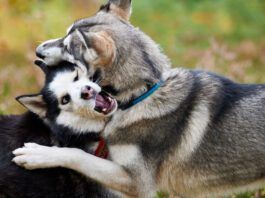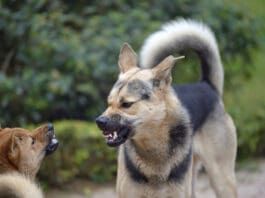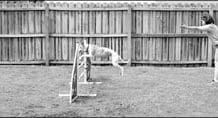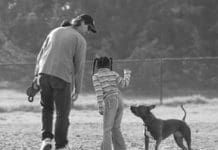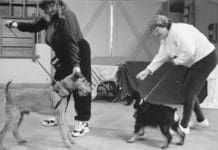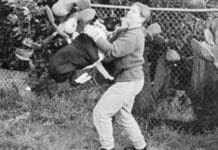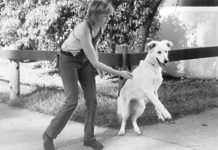Modifying Aggressive Dog Behavior
That loud buzz you hear is the sound of the dog behavior and training community discussing a controversial new approach to modifying aggressive behavior in dogs. The developers of "Constructional Aggression Treatment" (CAT) claim that the shaping-based operant protocol produces stronger and much faster results than the classical counter-conditioning process widely used by training and behavior professionals today. CAT was devised and tested by Dr. Jes¨²s Rosales-Ruiz, a behavior analyst and associate professor of behavior analysis at the University of North Texas, and Kellie Snider, a board-certified associate behavior analyst. Snider completed her MS in Behavior Analysis at UNT in 2007 with Dr. Rosales-Ruiz as her graduate research advisor and the CAT procedure as the topic of her thesis research. Canine behavior experts frequently use classical conditioning techniques (including counter-conditioning) to help change how dogs feel about and respond to the stimuli that triggers their aggressive behavior. In other words, classical counter-conditioning changes the dog's emotions in order to change his behavior. In contrast, CAT utilizes "operant conditioning," where the goal is changing the dog's behavior in a way that will likely produce a subsequent emotional change.
Agility Games for Managing Dog Aggression
Owning an aggressive, fearful, or other type of special needs" dog is stressful. When your dog overreacts to other dogs or just the stimulus of being out in the world by barking
Is Your Dog Bullying Other Dogs?
You can find them everywhere at dog parks and doggie daycare centers, in dog training classes, in your neighbor's yards ... perhaps even in your own home. They" are canine bullies dogs who overwhelm their potential playmates with overly assertive and inappropriate behaviors
Save Yourself in a Dog Attack
The tragedy of the 12-year-old boy killed by his family’s Pit Bulls in San Francisco once again highlights the importance of providing information that will help people survive such dog attacks – and perhaps the need for laws that encourage and require dog owners to be responsible for their dogs. Any large, powerful breed of dog will, occasionally, cause serious injury, even death. Small dogs can certainly bite, too, though they normally have less potential to do serious harm (the Pomeranian who killed a six-week-old infant in California in 2000 notwithstanding).
Letters: 08/04
Your vet should be a important member of your problem-solving team if your dog displays idiopathic aggression.
Rage Syndrome in Dogs
The term rage syndrome" conjures up mental images of Cujo
Avoiding Potential Dog Attacks
There are many reasons a person might tend to look the other way when confronted with a potentially dangerous dog. You may be busy; you may be fearful of the dog's owner or potential retaliation; you may be friends with the owner and reluctant to cause hard feelings between you; you may worry about being responsible for the dog's impoundment and possible euthanasia; or you may simply feel that it's none of your business.
Canine Class for Aggressive and Problematic Dogs
the focus is on gradually teaching dogs new and more appropriate responses to increasingly proximate contact with other dogs. Pupils begin learning new skills behind visual barriers
Causes of Reactive Dog Behavior and How to Train A Reactive Dog
“Reactive” is a term gaining popularity in dog training circles – but what is it, exactly? In her book Clinical Behavioral Medicine for Small Animals, Applied Animal Behaviorist Karen Overall, M.A., V.M.D., Ph.D., uses the term to describe animals who respond to normal stimuli with an abnormal (higher-than-normal) level of intensity. Take a deep breath and relax. We have positive training solutions for dogs who "go off" or "lose it" in certain circumstances.
How to Safely Break Up a Dog Fight
If you've ever been present when a dogfight broke out, you know how dangerous it can be for everyone concerned. I've lost track of how many times we've said this, but as always, prevention beats cure. It is imperative that you manage and train your own canine family to minimize the risk of serious dogfights. Identify situations that are likely to light the dogfight fuse, such as fence-fighting or resource guarding, and figure out how to avoid them and/or modify the behavior that causes them.
Living with a Difficult Dog
By your own standards, your dog’s life may not seem all that stressful – after all, he doesn’t have bills to pay, does he? But when you apply the more scientific definition of the word – anything that alarms or excites him, triggering his sympathetic nervous system into action and flooding him with the “fight or flight” chemicals adrenaline and noradrenaline – you may be able to see how many seemingly unrelated things in his environment actually contribute to his “misbehavior.”
Training and Socializing Dog-Aggressive Dogs
Going for a walk with your dog may be one of your favorite ways to exercise and relax, but your pleasant outing can quickly turn into a stressful one if you happen to encounter another dog running loose. If the other dog is threatening or your own dog reacts aggressively, the situation can become downright dangerous. Like most owners of dog-aggressive dogs, Thea McCue of Austin, Texas, is well aware of how quickly an outdoor activity with her dog can stop being fun. Wurley, her 14-month-old Lab mix, is a happy, energetic dog who loves to swim and go running on the hike-bike trails around their home. But when he's on leash and spots another dog, he sometimes barks, growls, and lunges. Since he is 22 inches tall and weighs 60 pounds, he can be hard to handle, says McCue. When he pounced on one little 10-pound puppy





